英国文学选读unit7
- 格式:ppt
- 大小:727.50 KB
- 文档页数:18
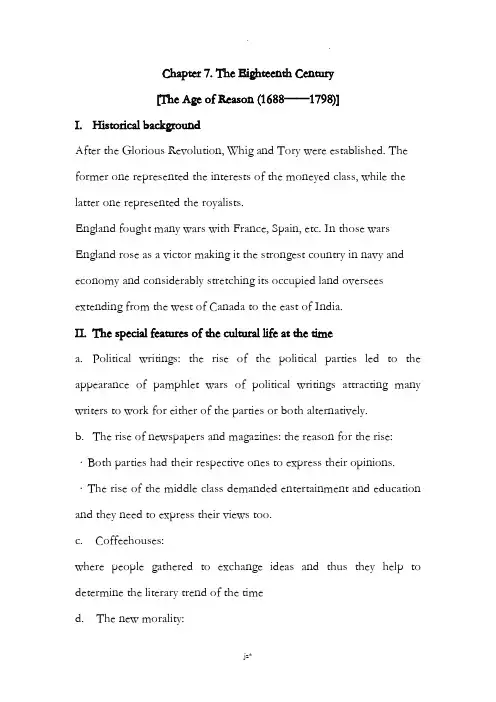
Chapter 7. The Eighteenth Century[The Age of Reason (1688——1798)]I. Historical backgroundAfter the Glorious Revolution, Whig and Tory were established. The former one represented the interests of the moneyed class, while the latter one represented the royalists.England fought many wars with France, Spain, etc. In those wars England rose as a victor making it the strongest country in navy and economy and considerably stretching its occupied land oversees extending from the west of Canada to the east of India.II. The special features of the cultural life at the timea. Political writings: the rise of the political parties led to the appearance of pamphlet wars of political writings attracting many writers to work for either of the parties or both alternatively.b. The rise of newspapers and magazines: the reason for the rise: ·Both parties had their respective ones to express their opinions. ·The rise of the middle class demanded entertainment and education and they need to express their views too.c. Coffeehouses:where people gathered to exchange ideas and thus they help to determine the literary trend of the timed. The new morality:·The emphasis on reason·The development of tolerance of different opinions in politics and religione. The influence of science and technology:·Principia Mathematica in 1687 by Newton (1642——1727)·The new epistemology of John Locke (1632——1704)f. French influence——Augustanism——neoclassicism stressing to learn from the classicals*What is classicism"The characteristics in Greek and Roman classical works. They are clarity, logic, form, proportion, balance with each other, parallelism, restraint.III. The characteristics of neoclassicism1.Reason rather than emotion and form rather than content were emphasized.2.Most of the writings at the time were didactic and satirical.3.The closed couplet was the only possible verse form for serious work for elegance, correctness, appropriateness and restraint were preferred.4.It is exclusively a "town〞poetry, catering to the interests of the "society〞in great cities. The humbler aspect of life are neglected and it showed in most part no love of nature, landscape, or country things and peoplecking romantic elements and being hostile to medieval literature6.An age of prose, especially the latter part the centuryIV. Representative authors of the time1. Daniel Defoe2. Jonathan Swift3. Joseph Addison4. Alexander Pope5. Samuel Johnson6. Henry Fieldding7. Thomas Gray8. Thobias George Smollet9. Richard Brinsley Sheridan10. Robert Burns11. William Blake1.Daniel Defoe(1661—1731)a pioneer novelist of England and also a prolific writer of books and pamphlets on a great variety of subjects.1)his life story:a.from a dissenter’s family: Presbyterian butcherb.having a questionable character in politics, but strong belief in religious freedom2)his literary achievements:·fiction:Robinson , Crusoe , Moll Flanders·contribution to journalism & regulating English trade methods and principles3) characteristics of his fiction:a.Robinson Crusoe:(1)based on real experience of a Scottish sailor but bined with his own imagination, it is still a fictional work.(2)using the picaresque frame with a story in the shape of a journal and having strong sense of journalistic truth; containing serious wisdom of life(3)The importance of the hero:i. typical of the rising English bourgeois class, practical and diligent with a restless curiosity to know more about the world and a desire to prove individual power in the face of social and natural challengesIi. a real hero of middle class different from the hero of knights or epic hero(4)moral teaching: sing praise of labour, presenting it as the source of human pride and happiness as well as a means to change man’s living conditions from desperation to prosperity(5)limitations:i. praise colonization overseas through the relationship with Fridayii. his attitude to woman is open to criticismiii. Praise slaveryb. Moll Flanders:(1) its story(2)the significance, one is for the first a woman being the protagonist; artistically more mature than Robinson: better structure and better plot; so it is written in an autobiographical form called a memoir2. Jonathan Swift(1667-1745)a churchman and also a university graduate who viewed human society with contempt and has been called a cynic and even a misanthrope. 1)his life story:His father died before he was born, and he had to accept the aid of his relatives and finished his study at Dublin University.2)his literary achievements:a.satirical essays:The Battle of Books(1696-1698), A Tale of the Tub(1696-1698)b.Writings in pamphlets:The Draiper’s Letters, A Modest Proposac.fiction:Gulliver’s Travel(1726)3)characteristics of his pamphlets:·Gulliver’s Travela. criticizing the oppression and exploitation of the Irish people by the absentee landlords and the English government.b. using bitter satire·The battle of Booksa debate happening 18th century. Some people modern people ·The Tale of the Tuba satire on various religious sects: Catholic, Anglican and dissenters’churches: changes done by different churches to the Christian doctrines·The Draiper’s Lettersrevealing the corruption and license, debased·A Modest Proposala satire on the English government’s heavy exploitation4)A Modest Proposala.It is a bitter satire on the policy of the English government towards the Irish people.b.Swift in this article suggested to the Irish people that the best way to end their misery was to produce children and sell them at market as a delicious dish for the rich.3. Joseph Addison(1672-1719)and Richard Steele(1672-1729)1) their life stories: they were born in the same year, attended the same school and later studied at the same university.they had the samepolitical trend——whig2) their literary achievements:Joseph Addison & Richard Steele·Joseph Addisonstarted the periodical essays that were the most characteristic genre of 18thcentury literature.·Richard Steelecontribution to the periodicals:The Tatler, The Spectator, The Guardian3)characteristics of their periodical essays:a.Methods:d, indirect, was admirably adapted to their purpose.2. were full of wit, humor, and satire.b. Themes:dealt with1)light topics-fashions, head-dresses, practical jokes,2)polite conversations, discussed art, philosophy, drama, and poetry, and sought in so doing not only to interest the general reader in such subjects, but also to guide and develop their tastes.3) deeper topics such immoralityOne other characteristic: draw some images of some typical middle class people:C. Style: simple language familiar to the middle men; graceful, poised, well balanced, familiar words and expressions to the readers,4)Aims of their writing:a.to educate the newly risen middle class.b.to bridge the gap between the small circle of London elegance and wit,and the large, serious, rather Puritan middle class.5)two selected pieces written by Addisona. The Royal Exchangeb. Sir Roger at Church4.Alexander Pope(1688-1744)1) his life story:·he was self-educated.·he worked hard against poor health and unfavorable conditions and gained a profound knowledge of both the classics and the craft of writing.2)his literary achievements:·An Essay on Criticism, The Rape of the Lock, An Essay on Man ·Contribution to poetry in heroic couplets3)characteristics of his poems:a. succeeded Chaucer and Dryden in bringing metrical form to its perfection.b. contained a great number of quotable lines that have passed intoeveryday speech as popular sayings, such as :"To err is human, to forgive divine〞, and "For fools rush in where angels fear to tread.〞c. limitation: Pope is never profound in thought, so the poems lack original ideas5.Samuel Johnson(1709-1784)the greatest English man of letters between Pope and Wordsworth. 1) his life story:·he was born in a book seller’s family.·he was conservative in his world outlook and was against any kind of reform or innovation.·he upheld tradition and authority. Uphold conventions authority 2)his literary achievements:·A Dictionary of the English Language·Contribution to a periodical, The Rambler,·Known for essay; his Preface to his edition of Shakespeare and The Lives of the Poets3)characteristics of his writing:Emphasizing the specification of language6. Henry Fielding(1707-1754)playwright, novelist and district law magistrate, came from an aristocratic background1) his life story:·was born to an upper-class family·began writing plays while at university and took it as his profession after leaving school.2)his literary achievements:novels:The History of the Adventures of Joseph Andrews,The History of Tom Jones3)characteristics of his novels:a. The History of the Adventures of Joseph Andrew( 1) its story and significance(2)in his preface to this novel Fielding proudly announced that he had created a new genre called ic epics in prose and discussed its characteristic feature.(3)the novel turned from a novel of seduction into one of the first exemplars of the great English panoramic tradition, which was to reach new heights later in Thackeray and Dickens.b. The History of Tom Jones(1) its story(2) Its significance:a. the understanding of allegory in the storyb. to Fielding, the countryside represents the basic goodness of human race, whereas the city stands for evil and sin.Tobias George SmollettA general introductionTobias George Smollett (19 March 1721 –17 September 1771) was a Scottish poet and author.He was best known for his picaresque novels, such as·The Adventures of Roderick Random (1748),·The Adventures of Peregrine Pickle(1751), which influenced later novelists such as Charles Dickens.·His last novel, the best novel is The Expedition of Humphry Clinker (1771), published in the year of his death.7. Thomas Gray(1716-1771)one of the representative poets at the time1) his life story:was born in London and educated at Eton and Cambridge, where he, after a grand tour on the continent, spent the rest of his life.2)characteristics of his poems:·more natural and spontaneous in thought·emphasizing emotions and sentiments3)The Elegy Written in a Country Churchyard8. Richard Brinsley Sheridan (1751-1816)1) his life story:was born in Dublin, of Irish origin, and was educated at Harrow.2)his literary achievements:drama: The Rivals, A Trip to Sarborough, The School for Scandal3)The School for Scandala. its story and significanceb. it is written in the tradition of edy of Manners, and exposes the immorality, hypocrisy, money-hunting, and scandal-mongering of the idle classes in 18th century England.9. Robert Burns(1759-1796)1) his life story:was born in Scotland in a poor peasant family and educated himself through selfstudy.2)his literary achievements:poems and songs3)characteristics of his poems and songsa.written in the Scottish dialect and in the tradition of Scottish folk songs.b.besides love lyrics, most of his poems and songs are about patriotic and political themes.10. William Blake (1757-1827)a poet as well as an engraver.1)his life story:was born in a hosier’s family in London and drew pictures andengraved to illustrate his works and the works of others.2)his literary achievements:·poems:Poetical Sketches, Songs of Innocence,Songs of Experience, Prophetic Books·broke with the neo-classical tradition both in form and in content3)characteristics of his poemsa. Songs of Innocence(1) expressed the poet’s delight in life,even in the face of sorrow and suffering.(2)the world is seen through the eyes of a child’s imagination which can be attained by adults if they cast away the follies and deceits of the hostile world and seek a visionary world through their imagination.b. Songs of Experience(1) the atmosphere is no longer sunny but sad and gloomy, and evil is found everywhere in this world.(2) through the loss of imagination, man has bee a slave to the falsehood and hypocrisy of religion and society, and thus has lost the Heaven of Innocence and gained the Hell of Experience.c. the contradiction of these two poem collections。
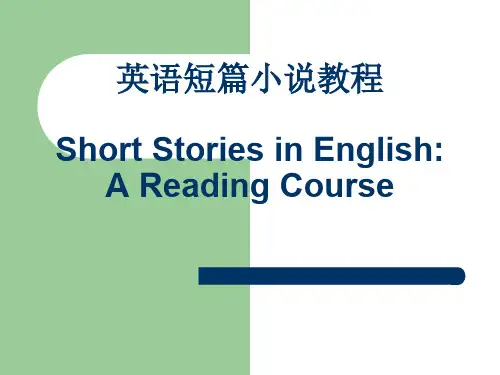
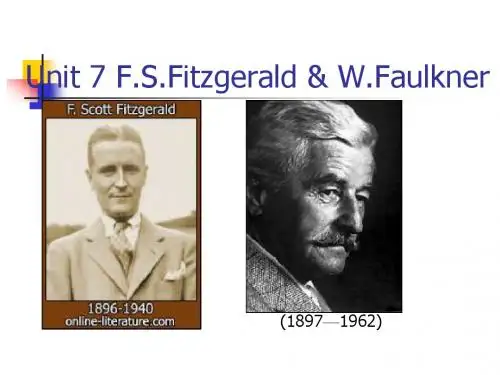
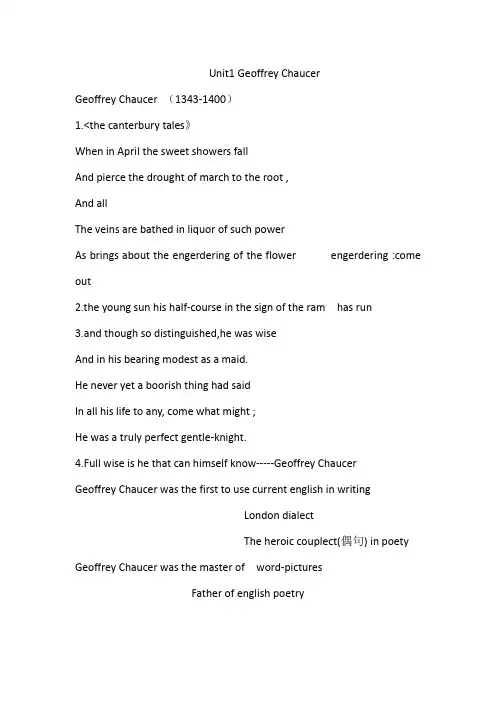
Unit1 Geoffrey ChaucerGeoffrey Chaucer (1343-1400)1.<the canterbury tales》When in April the sweet showers fallAnd pierce the drought of march to the root ,And allThe veins are bathed in liquor of such powerAs brings about the engerdering of the flower engerdering :come out2.the young sun his half-course in the sign of the ram has run3.and though so distinguished,he was wiseAnd in his bearing modest as a maid.He never yet a boorish thing had saidIn all his life to any, come what might ;He was a truly perfect gentle-knight.4.Full wise is he that can himself know-----Geoffrey ChaucerGeoffrey Chaucer was the first to use current english in writingLondon dialectThe heroic couplect(偶句) in poety Geoffrey Chaucer was the master of word-picturesFather of english poetryUnit2 William Shakespeare(1564-1616)1.William Shakespeare is one of greatest literary giants of alltimes.2.35plays 2 narrative poems 154 sonnets(十四行诗)3.Tragedy comedy trage-comedy and history plays4.He created his own form of sonnets the Shakespearean sonnets5.He was a great master of blank verse (无韵诗)6.He successfully potrayed many characters7.Hamlet’s hesitation shows him as a man of renaissance8.The so-called hesitation of hamlet is means to reform the society as awhole not his personal revenge.9.To die or not to be,that is a question---hamlet10.So long as men can breathe or eyes can seeSo long life this ,and this gives life to thee(you)---sonnet 18 of ShakeSpeare11 rhyme scheme(韵式) abab cdcd efef gg12 what a piece of work is a man ,how noble in reason ,how infinite in faculties ,in form and moving ,how express and admirable in action ,how like an angle in apprehension ,how like a god !The beauty of the word ;the paragon(best example) of animals;and yet to me /what is this quitessence(best part) of dust? Willam shakespeareUnit 3 Fancis Bacon(1561-1626)1.Fancis Bacon was founder of modern science2.Fancis Bacon Was great essayist3.Wives are young men’s mistresses,companions for middle age,andold men’s nurses,so as a man may have a quarrel(reason)to marry when he will.-----of marriage and single life4.Studies serve for delight,for ornament ,and for ability.their chief usefor delight is in privateness and retiring ;for ornament ,is in discourse ;and for ability ,is in the judgementand disposition of business.------of studies5.Histories make men wise,poets, witty;---- of studies(读书使人明智,读史使人聪慧)6.Studies go to form one’s character.7.Knowledge is power.------francis bacon.Unit 4 17th-century british poets1.17th-century British poets:Jone Donne(1572-1631)2.Jone Milton’S writing style is:sublimity of thought and magisty of expression3.No man is island ,entire of itself; every man is a piece of the continent,a part of the main…Any man’s death disminishes me,because I am involved in mankind; and therefore never send to know for whom the bell tolls ;it tolls for thee.-------Jone Danne4.Truth is compared …. to a streaming fountain; if her waters flow not ina perpetual progression,they sicken into a muddy pool or conformity and tradition.-------Jone MiltonUnit 5 Adventure fiction writers1.Daniel Defoe(1660-1731):<<the life and the strange surprisingadventure of ronbinsoncrusoe>> .2.He wrote the first realistic novel in english literature3.He is father of english novel.4.He combined bold imagination with realism and made his storyconvincing.5.He’s writing style:proper words in proper places,make the truedefinition of a style.6.Robinson cruce is a typical example of english bourgecissie at theearlier stage of development ,full of pioneering spirit.7.All evils are to be considered with the good that is in them,and withwhat worse attends them.(塞翁失马焉知非福)8.Every clound is silver lining.(与6意思相同)Jonathan swift (1667-1745)1.以讽刺见长,是讽刺文学的一代宗师。
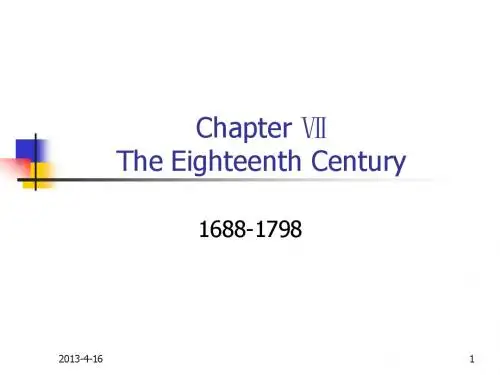
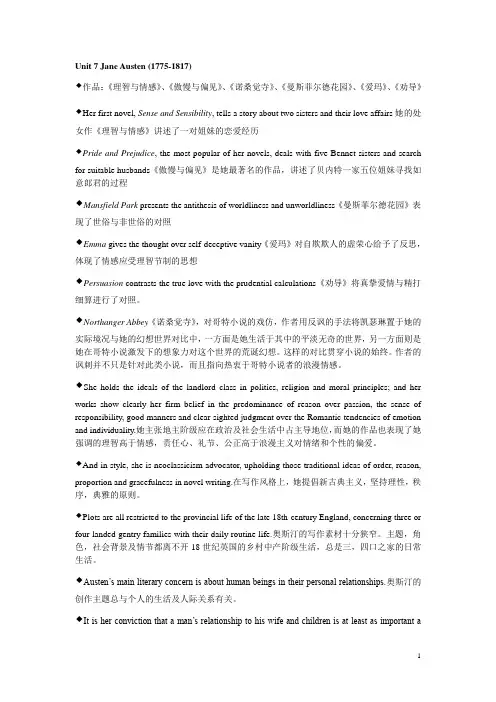
Unit 7 Jane Austen (1775-1817)♦作品:《理智与情感》、《傲慢与偏见》、《诺桑觉寺》、《曼斯菲尔德花园》、《爱玛》、《劝导》♦Her first novel, Sense and Sensibility, tells a story about two sisters and their love affairs她的处女作《理智与情感》讲述了一对姐妹的恋爱经历♦Pride and Prejudice, the most popular of her novels, deals with five Bennet sisters and search for suitable husbands《傲慢与偏见》是她最著名的作品,讲述了贝内特一家五位姐妹寻找如意郎君的过程♦Mansfield Park presents the antithesis of worldliness and unworldliness《曼斯菲尔德花园》表现了世俗与非世俗的对照♦Emma gives the thought over self-deceptive vanity《爱玛》对自欺欺人的虚荣心给予了反思,体现了情感应受理智节制的思想♦Persuasion contrasts the true love with the prudential calculations《劝导》将真挚爱情与精打细算进行了对照。
♦Northanger Abbey《诺桑觉寺》,对哥特小说的戏仿,作者用反讽的手法将凯瑟琳置于她的实际境况与她的幻想世界对比中,一方面是她生活于其中的平淡无奇的世界,另一方面则是她在哥特小说激发下的想象力对这个世界的荒诞幻想。
这样的对比贯穿小说的始终。
作者的讽刺并不只是针对此类小说,而且指向热衷于哥特小说者的浪漫情感。
♦She holds the ideals of the landlord class in politics, religion and moral principles; and her works show clearly her firm belief in the predominance of reason over passion, the sense ofresponsibility, good manners and clear-sighted judgment over the Romantic tendencies of emotion and individuality.她主张地主阶级应在政治及社会生活中占主导地位,而她的作品也表现了她强调的理智高于情感,责任心、礼节、公正高于浪漫主义对情绪和个性的偏爱。
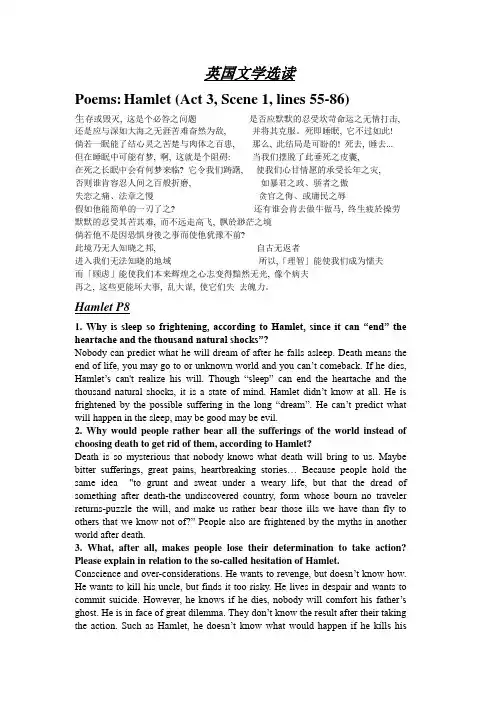
英国文学选读Poems:Hamlet (Act 3, Scene 1, lines 55-86)生存或毁灭, 这是个必答之问题是否应默默的忍受坎苛命运之无情打击, 还是应与深如大海之无涯苦难奋然为敌, 并将其克服。
死即睡眠, 它不过如此!倘若一眠能了结心灵之苦楚与肉体之百患, 那么, 此结局是可盼的! 死去, 睡去...但在睡眠中可能有梦, 啊, 这就是个阻碍: 当我们摆脱了此垂死之皮囊,在死之长眠中会有何梦来临? 它令我们踌躇, 使我们心甘情愿的承受长年之灾,否则谁肯容忍人间之百般折磨, 如暴君之政、骄者之傲失恋之痛、法章之慢贪官之侮、或庸民之辱假如他能简单的一刃了之? 还有谁会肯去做牛做马, 终生疲於操劳默默的忍受其苦其难, 而不远走高飞, 飘於渺茫之境倘若他不是因恐惧身後之事而使他犹豫不前?此境乃无人知晓之邦, 自古无返者进入我们无法知晓的地域所以,「理智」能使我们成为懦夫而「顾虑」能使我们本来辉煌之心志变得黯然无光, 像个病夫再之, 这些更能坏大事, 乱大谋, 使它们失去魄力。
Hamlet P81. Why is sleep so frightening, according to Hamlet, since it can “end” the heartache and the thousand natural shocks”?Nobody can predict what he will dream of after he falls asleep. Death means the end of life, you may go to or unknown world and you can’t comeback. If he dies, Hamlet’s can't realize his will. Though “sleep” can end the heartache and the thousand natural shocks, it is a state of mind. Hamlet didn’t know at all. He is frightened by the possible suffering in the long “dream”. He can’t predict what will happen in the sleep, may be good may be evil.2. Why would people rather bear all the sufferings of the world instead of choosing death to get rid of them, according to Hamlet?Death is so mysterious that nobody knows what death will bring to us. Maybe bitter sufferings, great pains, heartbreaking stories…Because people hold the same idea "to grunt and sweat under a weary life, but that the dread of something after death-the undiscovered country, form whose bourn no traveler returns-puzzle the will, and make us rather bear those ills we have than fly to others that we know not of?” People also are frightened by the myths in another world after death.3. What, after all, makes people lose their determination to take action? Please explain in relation to the so-called hesitation of Hamlet.Conscience and over-considerations. He wants to revenge, but doesn’t know how. He wants to kill his uncle, but finds it too risky. He lives in despair and wants to commit suicide. However, he knows if he dies, nobody will comfort his father’s ghost. He is in face of great dilemma. They don’t know the result after their taking the action. Such as Ham let, he doesn’t know what would happen if he kills hisuncle or kills himself. So Hamlet was hesitated.Sonnet 18 P15我怎么能够把你来比作夏天?你不独比它可爱也比它温婉:狂风把五月宠爱的嫩蕊作践,夏天出赁的期限又未免太短:天上的眼睛有时照得太酷烈,它那炳耀的金颜又常遭掩蔽:被机缘或无常的天道所摧折,没有芳艳不终于雕残或销毁。
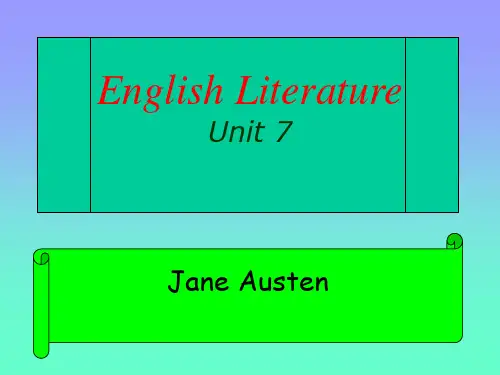
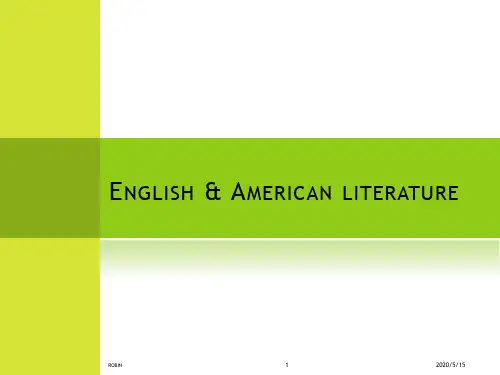
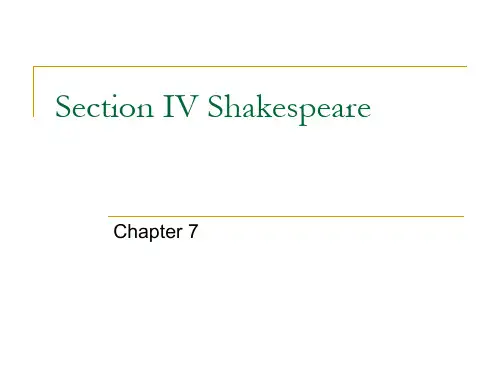
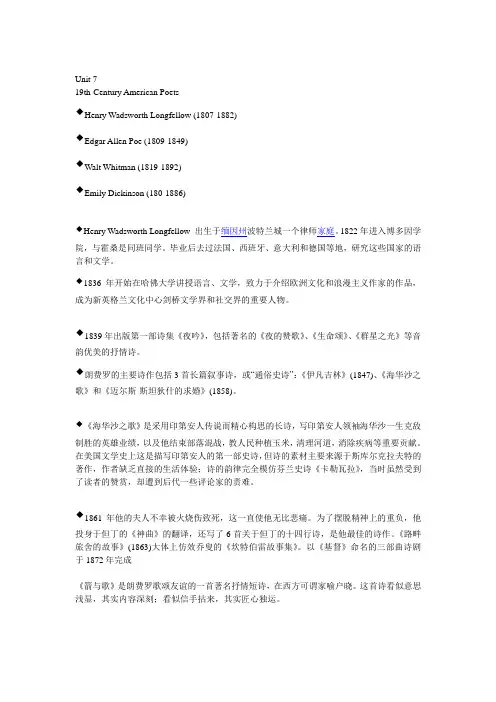
Unit 719th-Century American Poets♦Henry Wadsworth Longfellow (1807-1882)♦Edgar Allen Poe (1809-1849)♦Walt Whitman (1819-1892)♦Emily Dickinson (180-1886)♦Henry Wadsworth Longfellow 出生于缅因州波特兰城一个律师家庭。
1822年进入博多因学院,与霍桑是同班同学。
毕业后去过法国、西班牙、意大利和德国等地,研究这些国家的语言和文学。
♦1836年开始在哈佛大学讲授语言、文学,致力于介绍欧洲文化和浪漫主义作家的作品,成为新英格兰文化中心剑桥文学界和社交界的重要人物。
♦1839年出版第一部诗集《夜吟》,包括著名的《夜的赞歌》、《生命颂》、《群星之光》等音韵优美的抒情诗。
♦朗费罗的主要诗作包括3首长篇叙事诗,或―通俗史诗‖:《伊凡吉林》(1847)、《海华沙之歌》和《迈尔斯·斯坦狄什的求婚》(1858)。
♦《海华沙之歌》是采用印第安人传说而精心构思的长诗,写印第安人领袖海华沙一生克敌制胜的英雄业绩,以及他结束部落混战,教人民种植玉米,清理河道,消除疾病等重要贡献。
在美国文学史上这是描写印第安人的第一部史诗,但诗的素材主要来源于斯库尔克拉夫特的著作,作者缺乏直接的生活体验;诗的韵律完全模仿芬兰史诗《卡勒瓦拉》,当时虽然受到了读者的赞赏,却遭到后代一些评论家的责难。
♦1861年他的夫人不幸被火烧伤致死,这一直使他无比悲痛。
为了摆脱精神上的重负,他投身于但丁的《神曲》的翻译,还写了6首关于但丁的十四行诗,是他最佳的诗作。
《路畔旅舍的故事》(1863)大体上仿效乔叟的《坎特伯雷故事集》。
以《基督》命名的三部曲诗剧于1872年完成《箭与歌》是朗费罗歌颂友谊的一首著名抒情短诗,在西方可谓家喻户晓。
这首诗看似意思浅显,其实内容深刻;看似信手拈来,其实匠心独运。
诺顿英国文学选集第七版诺顿英国文学选集第七版是一本汇集了英国文学经典作品的文集。
本文档将对该选集进行详细介绍,旨在向广大读者展示其内涵和价值。
该选集共包含了英国文学史上重要的作品,按照时间顺序排列,从中世纪到当代,涵盖了各个文学流派和主题。
这些作品代表了英国文学的瑰宝,具有深远的影响力和艺术价值。
选集首先介绍了英国文学的历史背景,以便读者更好地理解各个时期的文学发展和作品特点。
随后,根据时代先后,逐一介绍了每部作品的作者、作品背景、主题和风格特点。
其中,我们可以欣赏到中世纪诗歌的壮丽和浪漫,如乔叟的《坎特伯雷故事集》;文艺复兴时期的人文主义精神在莎士比亚的戏剧作品中得到完美体现,如《哈姆雷特》和《罗密欧与朱丽叶》;18世纪启蒙运动的思想火花在斯威夫特的《格列佛游记》中熠熠生辉;维多利亚时代的小说作品如狄更斯的《远大前程》和勃朗特姐妹的《呼啸山庄》,展现了当时社会的种种问题和人性的复杂性。
此外,选集中还收录了一些现代作品,如乔伊斯的《尤利西斯》,它以其独特的叙事结构和思想深度赢得了广泛赞誉。
同时,也收录了一些当代作品,如麦卡锡的《路》和艾利斯的《美国牛仔》等,意味着英国文学正在不断扩展和变化。
诺顿英国文学选集第七版作为一本权威的文学选集,它不仅为读者提供了全面的英国文学资源,还为深入了解英国文学的发展和演变提供了宝贵的参考。
通过阅读这些作品,读者可以体验到不同时期文学作品的风采,了解到不同作家对人类生活、社会问题和人性的深刻剖析。
总之,诺顿英国文学选集第七版是一本值得我们细细品味的经典文集。
通过阅读其中的作品,我们可以感受英国文学的魅力与骄傲,开启一段精神之旅,丰富我们的思想和情感。
希望这本选集能够为广大读者带来愉悦的阅读体验,成为他们文学探索的指南。
第7单元简•奥斯汀1.Do you agree with the statement“it is a truth universally acknowledged that a single man in possession of a good fortune must be in want of a wife”?What is the relationship between money and marriage?Key:Yes,I agree.It is reasonable that when a man is mature enough he wants to get married and raise a family.That is a necessary part of his success and accomplishment.More importantly,he has to earn enough money to support his family.So,when he possesses such kind of fortune,he wants to achieve this purpose.Money is not the only criteria of a happy marriage,but a happy marriage cannot achieve without enough money.Without money,we also can get married with our lovers,and we can earn money by working hard together.As time goes on,if we can get enough money to support our families,we will feel satisfied and live happily.However,if we cannot earn a good fortune,but live a poor life,we will encounter many practical problems,and our pride and confidence will be ruined,thus it is difficult to be happy.Money does have something to do with marriage,but is not crucial.What really matters in marriage is love and affection between the couple.2.What do you think of Mrs.Bennet?How can you characterize her?Key:I think Mrs.Bennet is very typical of middle-aged woman.She is worriedabout her daughters’marriage,and is eager to marry them off.She is somewhat a gossip;she is easy to get nervous;she likes to make a fuss about everything.3.What makes Elizabeth feel so grateful to Darcy?How does Darcy respond to her? Key:Elizabeth’s sister Lydia has always been ter in the novel,she elopes with Wickham,who is poor and hypocritical,and lives with him out of wedlock.This behavior is not recognized at that time and destroys the Bennets’reputation.Although Lydia has the plan to marry Wickham,who as a playboy, considers everything as a game.Elizabeth is so worried with her sister,so she decides to leave her hometown to find her sister.Fortunately,Darcy gives a helping hand.He finds them and tries his best to convince Lydia to come back. Faced with Wickham’s greedy,he doesn’t flinch.He pays the debts for Wickham and gives Lydia a large amount of money.In order to help them,he also buys an office post for Wickham.Besides,Darcy is also very gentle;he does not expose Wickham so as to protect the whole family’s reputation.He does everything for Elizabeth,and he doesn’t want her to be harmed.Darcy is very proud at the beginning,which makes Elizabeth hate him so much,but after he has done so many things,Elizabeth’s prejudice is eliminated and she feels so grateful to Darcy.Darcy feels sorry at the beginning.He is also surprised and excited.At first, he doesn’t want Elizabeth to know everything.However,he is delighted that Elizabeth is not as indifferent to him as before.He has never wanted to get hergratitude,but this time he feels hopeful.He tells Elizabeth that all his done was for her only,because it’s only her in his heart.He shows his affections to her again which makes Elizabeth so embarrassed.Darcy also apologizes for his pride in the past time.Now,they have cleared up the misunderstanding.It’s a turning point of their emotional journey.。